![Olencki, Weston: Old Time Music [CASSETTE w/ DOWNLOAD] (Tripticks Tapes) Olencki, Weston: Old Time Music [CASSETTE w/ DOWNLOAD] (Tripticks Tapes)](https://www.teuthida.com/productImages/misc4/32210.jpg)
Multi-instrumentalist & experimental composer Weston Olencki in three historically-driven sound works, recording with saxophonist Anna Webber as they explore the tenor sax in jazz and recording studio technology; the banjo with bluegrass and the mechanized modernism of the Carolinas; and a pump organ with Sacred Harp hymnody and the aging marble industries of Vermont.
Out of Stock
Quantity in Basket: None
Log In to use our Wish List
Shipping Weight: 4.00 units
Sample The Album:
Weston Olencki-composer, tenor saxophone
Anna Webber-tenor saxophone
Click an artist name above to see in-stock items for that artist.
Label: Tripticks Tapes
Catalog ID: TTT017
Squidco Product Code: 32210
Format: CASSETTE
Condition: New
Released: 2022
Country: USA
Packaging: Cassette
Recorded mostly in Brattleboro, Vermont, and Greenfield, Massachusetts, between 2020-2022.
"Following the conceptual avant-hillbilly trajectory of their previous SUPERPANG release "Verd Mont", Old Time Music is composer/improviser Weston Olencki's newest collection of historically-driven sound works.
The album's three pieces are rooted in the specific intersections between musical instruments, their associated genres, and broader cultural/material histories: the tenor saxophone with jazz and recording studio technology (tenor madness), the banjo with bluegrass and the mechanized modernism of the Carolinas (a vine that grew over the city...), and the pump organ with Sacred Harp hymnody and the aging marble industries of Olencki's home in Vermont (Charon guiding the weary...).
Old Time Music explores just that: sound that binds itself to remembrance, futurism, (nonlinear) time, and the living musical traditions of America."-Tripticks Tapes
"In the past decade, Weston Olencki's work as a multifaceted artist has explored the limits of instruments and electronic systems to create abstract visceral pieces. Out May 13, 2022 on Tripticks Tapes, their newest album, Old Time Music, invests in place and tradition by examining how the tenor saxophone, banjo, and pump organ are entangled in broader "cultural and material histories." At its best, Old Time Music uses technological experimentation to raise poignant questions about the living musical traditions of America.
"tenor madness" explores the history of tenor saxophone improvisation in the recording studio. A machine listening program stands in for tradition, creating a unique sound from a library of 300 recorded tenor saxophone excerpts from 1939 to the present. On the album, tenor saxophonist Anna Webber leads the program through an improvisation that shifts from frenzied ensemble textures to a poetic dialogue. Eventually, the lines between human and computer improviser are blurred as the program's sounds blend with the long poetic phrases in Webber's final solo. This freewheeling improvisation suggests that post-human abstraction is part of an evolving tradition. Yet, an unprocessed sample at the end of the piece seems to leave this idea open: What does the program contribute musically and socially to the living traditions it draws from?
"a vine that grew over the city and no one noticed" uses AI programs, field recordings, and archival recordings to meditate on industrialization in North and South Carolina. AM radio sounds evoke traditions of radio listening in rural/industrial life while connecting the piece's four movements that explore the region's soundscapes and musical traditions.
"Cripple Creek // Pretty Polly" finds the resonances between bluegrass banjo traditions and 20th century industrialization. Two dueling "electromechanical" banjos use a machine learning program to turn fragments from bluegrass songs into a relentless drone that loosely resembles a "Scruggs Style" picking pattern. This abstract mechanized version of traditional bluegrass blends into archival recordings of locomotives that once traced the region. However, like the economies and machines that supported Carolinian mill-towns, the electromechanical banjos gradually falter into glitching repeated notes and static drones.
"Saluda Grade //Moonshiner" features sparse whirring and pitched samples that give way to mechanized sounds, creating thick smoky textures of machines slowly groaning back online. Evoking the human side of industrialization, processed samples echo moaning voices, gasping breaths, and labor/ballad song traditions. Following similar themes, "Nacthmusik" depicts an industrial landscape that has returned to nature with field-recordings of cicadas and other insects. The movement develops the percussive sounds of found objects into a blistering cacophony. Radio static, banjo picking, and reverb pierce the natural sounds, seemly contesting romanticized rhythms of post-industrial life.
"The by and by" is grounded in the distinctly human experience of coming home and listening to the radio after a day at work. Yet, the presumed listener settles on a post-modern radio collage that places the Carter Family's "Can the Circle be Unbroken" alongside well-known covers and almost recognizable versions created by Open AI's Jukebox program. This reflective moment ties together themes from the previous movements, but also raises a question that haunts the piece - What remains in the wake of industrialization and deindustrialization: people, songs, machines, or nature?
Charon guiding the weary 'cross the Long River (or, how to care for a dying instrument) directly engages this question by combining sounds from Sacred Harp singing and the detritus of extractive marble industries in Vermont. In the video and album version, four computer-controlled reed organs and electronically animated objects reverberate through an abandoned marble quarry in East Dorset, Vermont. Absent are the typical chorus of exuberant Sacred Harp singers that have continuously gathered in New England since the 1700s. Instead, each of the instruments falter and fall silent, the last of which is a foot laboring to keep the pump organ going and the sound of the Connecticut river.
In my own research in Appalachia, I'm reminded that "Old Time Music" is indelibly social, community based, and participatory. In this context, I listen to Old Time Music in dialogue with those working to shape tradition from within. I hear Emily Hilliard and Saro Lynch Thomason who are working at the edges of institutional and grass roots archives to recuperate women's voices in folk and bluegrass music circles. I'm listening with Olencki's Sonic Blanket, and work by Anna and Elizabeth, Nate May, and Brian Harnetty, which all blur the boundaries between experimentation, technology, and tradition while engaging with local and regional communities.
Old Time Music exists on the edge of a larger socio-cultural moment where many artists are inviting listeners to closely examine the intersecting resonances of tradition and extractive economies in our day-to-day lives - especially in the wake of deindustrialization. Olencki excels at blending computer processes with field and archival recordings to illuminate the histories of objects, instruments, and places. Yet, the album's use of AI and machine learning warp the human and social aspects that are so vital to tradition. The project ultimately opens rather than answers questions about how tradition is abstracted, the nuances of social music making, and why and how traditions live on."-Jacob Kopcienski, I Care If You Listen
Get additional information at I Care If You Listen
Artist Biographies
• Show Bio for Weston Olencki "Weston Olencki is a New York City based trombonist/composer specializing in the performance and production of experimental music & art. Weston is a member of Ensemble Pamplemousse and the Wet Ink Large Ensemble, one half of RAGE THORMBONES and People Making Sounds, and has performed with Ensemble Dal Niente, wasteLAnd, wildUP!, Fonema Consort, the San Francisco Contemporary Music Players, Talea Ensemble, sfSound, Wild Rumpus, Eco Ensemble, Chicago Symphony Orchestra's MusicNOW, and a.pe.ri.od.ic - under conductors Alan Pierson, Enno Poppe, Steven Schick, Marino Formenti, and Michael Lewanski. He was awarded the Kranichsteiner Musikpreis for Performance [2016] and a Stipendiumpreis [2014] from the Darmstadt Ferienkurse. His compositional work has been performed/commissioned by the Talea Ensemble/Earle Brown Music Foundation, Pamplemousse, Bass2Bass [Michelle Lou + Scott Worthington], People Making Sounds, trombonist Matt Barbier, clarinetist Erin Cameron, and saxophonist David Wegehaupt. An active proponent of new repertoire, Weston has pursued individual collaborative work with composers Eric Wubbels, Katherine Young, Mauricio Pauly, Dave Reminick, Michelle Lou, Ray Evanoff, and Timothy McCormack, alongside US/world premieres of pieces by Peter Ablinger, Bernhard Lang, Elliott Carter, Michael Gordon, James Saunders, Dai Fujikura, Katharina Rosenberger, Erik Ulman, and Chris Mercer. Festival/series appearances include Alatszto Hang [Budapest], Weisslich [London], Constellation's Frequency Series [Chicago], FOCIarts [New Orleans], Permutations [NYC/SF], sfSoundSalonSeries [SF], NUNC [Chicago], Indexical [Santa Cruz], Switchboard Presents [SF], OPTION [Chicago], and Omaha Under the Radar. Weston has held residencies at the University of California Santa Cruz, Harvard University [HGNM], NYU, and Stanford University, with upcoming residencies at Northwestern and CalArts. He has recorded for HatHut, Sound American, Indexical, and Clean Feed with forthcoming releases on Carrier." ^ Hide Bio for Weston Olencki • Show Bio for Anna Webber "Reedist Anna Webber, a Brooklynite by way of British Columbia, is one of the most exciting new arrivals on the New York avant-garde jazz scene in the past couple years. Her second album, SIMPLE, demonstrates the inextricable link between her improvising and her compositions; her detail-rich writing recalls the work of elders as disparate as Tim Berne and Henry Threadgill, and her busy motion evokes a fizzy sort of exhilaration.-Peter Margasak, Chicago Reader Anna Webber is an integral part of a new wave of the Brooklyn avant-garde jazz scene. A saxophonist and flutist who strives for the unexpected, she has furthermore consistently proven herself to be a unique and forward-thinking composer with releases such as 2014's SIMPLE (Skirl Records) and 2013's Percussive Mechanics. Binary, the follow-up to SIMPLE which features bandmates John Hollenbeck and Matt Mitchell, further establishes Webber as a compelling improvisor and composer." ^ Hide Bio for Anna Webber
11/20/2024
Have a better biography or biography source? Please Contact Us so that we can update this biography.
11/20/2024
Have a better biography or biography source? Please Contact Us so that we can update this biography.
Track Listing:
SIDE A
1. Tenor Madness 8:38
2. A Vine That Grew Over The City And No One Noticed, Pt. I. Cripple Creek // Pretty Polly 2. 14:37 14:37
SIDE B
1. A Vine That Grew Over The City And No One Noticed, Pt. Ii. 10:23pm Through The Saluda Grade // Moonshiner 12:00
2. A Vine That Grew Over The City And No One Noticed, Pt. Iii. Interlude (Nachtmusik) 7:58
3. A Vine That Grew Over The City And No One Noticed, Pt. Iv. "the By And By" 7:01
4. Charon Guiding The Weary 'cross The Long River (or, How To Care For A Dying Instrument) 16:36
Cassettes
Physical Releases that include Download Codes
Electro-Acoustic
Improvised Music
Free Improvisation
Jazz
Electroacoustic Composition
Organized Sound and Sample Based Music
Guitarists, &c.
Recordings by or featuring Reed & Wind Players
New in Experimental & Electronic Music
Recent Releases and Best Sellers
Staff Picks & Recommended Items
Search for other titles on the label:
Tripticks Tapes.


![Olencki, Weston: Old Time Music [CASSETTE w/ DOWNLOAD] (Tripticks Tapes) Olencki, Weston: Old Time Music [CASSETTE w/ DOWNLOAD] (Tripticks Tapes)](https://www.teuthida.com/productImages/full/32210.Full.jpg)
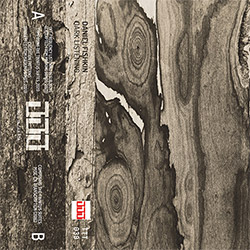

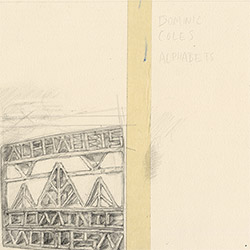

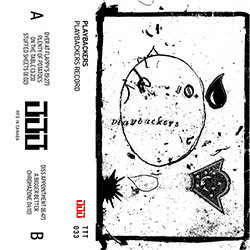




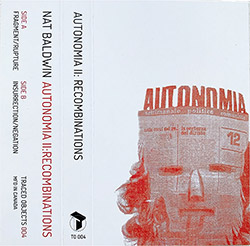
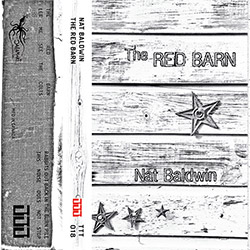
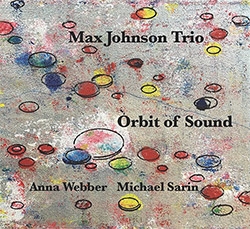
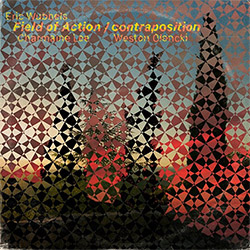
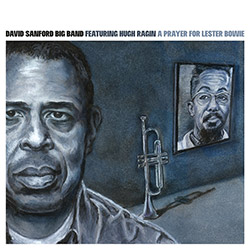
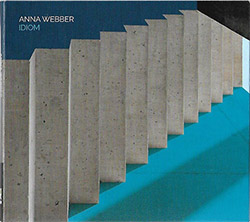

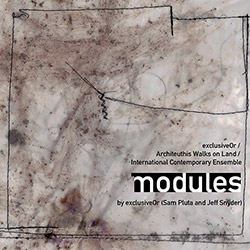
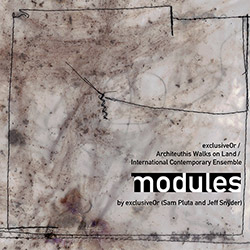

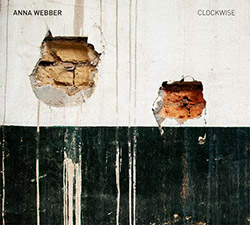

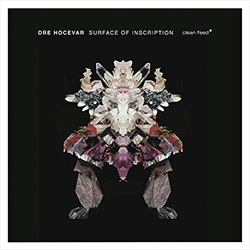


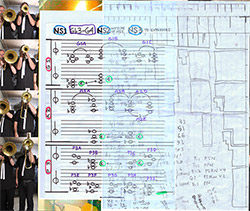



![Guy, Barry / Ken Vandermark: Occasional Poems [2 CDs]](https://www.teuthida.com/productImages/misc4/34849.jpg)
![Novoa / Carter / Mela Trio: Vol.1 [VINYL]](https://www.teuthida.com/productImages/misc4/35236.jpg)


![Elephant9 : Mythical River [VINYL]](https://www.teuthida.com/productImages/misc4/34624.jpg)
![Evans, Peter (Evans / Eldh / Black): Extra [VINYL]](https://www.teuthida.com/productImages/misc4/35279.jpg)

![McPhee, Joe: Straight Up, Without Wings [BOOK]](https://www.teuthida.com/productImages/misc4/35454.jpg)
![Jeck, Philip: rpm [2 CDs]](https://www.teuthida.com/productImages/misc4/35455.jpg)













![Barker / Parker / Irabagon: Bakunawa [VINYL]](https://www.teuthida.com/productImages/misc4/35533.jpg)
![Blaser, Samuel / Marc Ducret / Peter Bruun: Dark Was The Night, Cold Was The Ground [VINYL 10-inch]](https://www.teuthida.com/productImages/misc4/35492.jpg)








![Warren, Kenny (Warren / Hoffman / Ellman): Sweet World [VINYL]](https://www.teuthida.com/productImages/misc4/35451.jpg)




![Blake, Ran / Dave Knife Fabris: Live Amsterdam 2006, First Visit [CD + POSTCARDS]](https://www.teuthida.com/productImages/misc4/35275.jpg)













![DNS: Taking Big Bites Of The Khandas Three Cafes Deep [2 CDs]](https://www.teuthida.com/productImages/misc4/35334.jpg)




![Cleaver, Gerald: The Process [VINYL]](https://www.teuthida.com/productImages/misc4/34966.jpg)




![Alva Noto: HYbr:ID II [VINYL 2 LPs]](https://www.teuthida.com/productImages/misc4/35201.jpg)

![Baron, Derek / Luke Martin: Distinct and Concealed [CASSETTE + DOWNLOAD]](https://www.teuthida.com/productImages/misc4/35079.jpg)

![Lyle, Erica Dawn : Colonial Motels [CASSETTE + DOWNLOAD]](https://www.teuthida.com/productImages/misc4/35080.jpg)









![Sanna, Claudio: Compositori Sardi Contemporanei II [2 CDs]](https://www.teuthida.com/productImages/misc4/35317.jpg)







![Zurria, Manuel: Fame di Vento [3 CDs]](https://www.teuthida.com/productImages/misc4/35167.jpg)

![Granberg, Magnus / Nattens Inbrott / Skogen: Holde Traume, Kehret Wieder! [2 CDs]](https://www.teuthida.com/productImages/misc4/35038.jpg)
![Frey, Jurg: Outermost Melodie [2 CDs]](https://www.teuthida.com/productImages/misc4/35039.jpg)

![Pavone, Jessica: Reverse Bloom [VINYL]](https://www.teuthida.com/productImages/misc4/34895.jpg)




![Modney (Modney / Wooley / Gentile / Roberts / Pluta / Symthe / ...): Ascending Primes [2 CDs]](https://www.teuthida.com/productImages/misc4/34852.jpg)









![Elephant9 with Terje Rypdal: Catching Fire [VINYL 2 LPs]](https://www.teuthida.com/productImages/misc4/35355.jpg)
![Deerlady (Obomsawin, Mali / Magdalena Abrego): Greatest Hits [VINYL]](https://www.teuthida.com/productImages/misc4/34876.jpg)




![Haino, Keiji: Black Blues [2 CDs]](https://www.teuthida.com/productImages/misc4/35109.jpg)



![Surplus 1980: Illusion of Consistency [CD]](https://www.teuthida.com/productImages/misc4/35069.jpg)
![Staiano, Moe: Away Towards the Light [VINYL + DOWNLOAD]](https://www.teuthida.com/productImages/misc4/35037.jpg)



![Caveira (Gomes / Sousa / Abras / Ferrandini): Ficar Vivo [VINYL]](https://www.teuthida.com/productImages/misc4/34643.jpg)
![Gregg, J. J. / David Van Auken: Lunar Prairie [CD w/ DOWNLOAD]](https://www.teuthida.com/productImages/misc4/34611.jpg)

![Coultrain: Mundus [VINYL]](https://www.teuthida.com/productImages/misc4/32439.jpg)
![Mattin: Songbook #6 [VINYL]](https://www.teuthida.com/productImages/misc4/27317.jpg)
![Punkappella: Wake Up [7-inch VINYL]](https://www.teuthida.com/productImages/misc4/17519.jpg)
![Residents, The: WARNING: UNiNC.: Live And Experimental Recordings 1971-1972 [VINYL 2 LPs]](https://www.teuthida.com/productImages/misc4/31521.jpg)
![Coultrain: Phantasmagoria [VINYL]](https://www.teuthida.com/productImages/misc4/30142.jpg)
![Lennon, Sean Ono: Asterisms [VINYL]](https://www.teuthida.com/productImages/misc4/34517.jpg)

![Coley, Byron: Dating Tips for Touring Bands [VINYL]](https://www.teuthida.com/productImages/misc4/17906.jpg)

![Lost Kisses: My Life is Sad & Funny [DVD]](https://www.teuthida.com/productImages/misc4/lostKissesDVD.jpg)